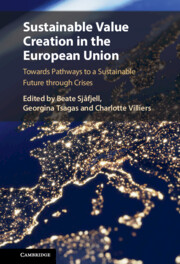 Sustainable Value Creation in the European Union
Sustainable Value Creation in the European Union The EU’s Constitutional and Ideological Straitjacket
from Part II - The (UN)Sustainability of the EU Economic System
Published online by Cambridge University Press: 01 December 2022
This chapter argues that the combination of the European economic and monetary constitution with neo-liberal ideology amounts to a straitjacket that is impeding the necessary move towards a more sustainable economy. The chapter explores the limitations on Member State fiscal spending contained in the Treaty on the Functioning of the European Union, and contrasts those limitations with the very broad discretion granted to central banks to conduct monetary policy. Central banks’ ‘quantitative easing’ policies have, as they were intended to, boosted asset prices, skewing wealth distribution in favour of the already wealthy. They have also lowered the borrowing costs facing governments and large corporations, but it is not clear that they have been successful in terms of stimulating economic growth through higher investment and spending. Finally, the chapter looks at the EUs fiscal and monetary response to the COVID-19 pandemic. Does it mark a permanent change that may lead to a more sustainable economy, or, as the pandemic recedes, will the EU return to its constitutional and ideological straitjacket? We fear it will be the latter.
To save this book to your Kindle, first ensure no-reply@cambridge.org is added to your Approved Personal Document E-mail List under your Personal Document Settings on the Manage Your Content and Devices page of your Amazon account. Then enter the ‘name’ part of your Kindle email address below. Find out more about saving to your Kindle.
Note you can select to save to either the @free.kindle.com or @kindle.com variations. ‘@free.kindle.com’ emails are free but can only be saved to your device when it is connected to wi-fi. ‘@kindle.com’ emails can be delivered even when you are not connected to wi-fi, but note that service fees apply.
Find out more about the Kindle Personal Document Service.
To save content items to your account, please confirm that you agree to abide by our usage policies. If this is the first time you use this feature, you will be asked to authorise Cambridge Core to connect with your account. Find out more about saving content to Dropbox.
To save content items to your account, please confirm that you agree to abide by our usage policies. If this is the first time you use this feature, you will be asked to authorise Cambridge Core to connect with your account. Find out more about saving content to Google Drive.